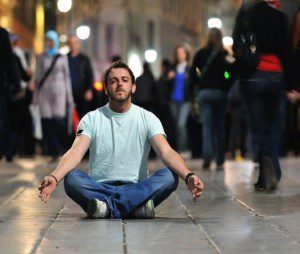Guest Writer for Wake Up World
We all meditate, whether we know it or not. This is because meditation occurs when we alter our brain wave frequency, and different activities, such as exercise, can do it naturally. Once we are aware of this, we can consciously participate in the ways in which we do meditate.
And considering how productive meditation is for our health, recognising the moments in which we are meditating in action will potentially increase its benefits.
Another sure-fire way to reap the rewards of meditation is to incorporate into our daily routine. Many people have wanted to try meditation, but never have, or they did but gave up after a relatively short time. This might be due to different reasons, such as they didn’t think that they were learning anything, it was too tedious and ineffective in the short term, they didn’t want to invest the time required or they felt they didn’t have the capacity to become advanced at it.
Yet meditation is just like exercise – if we want to make our bodies fit for living or our brains fit for meditation, we need to keep at it. It’s also true that the longer we meditate the greater we experience the physical and mental health benefits it can generate. It can also provide spiritual empowerment if we commit to it for long enough.
Looking at Meditation Objectively
From a scientific viewpoint, meditation is the act of changing our brainwaves, or more specifically, slowing the frequency down. Our standard operating state is around 13-30 cycles per second (Hz), which is called the beta range. Once we begin to meditate we enter an alpha range which is around 8-12Hz.
This is achieved simply by focusing our minds through common daily activities. For example, playing sport can be meditation. Strolling through the park might be meditation. Listening to music, reading a book and having sex are all possible forms of meditation. Even chopping vegetables, having a deep and meaningful conversation or just entering into a state of relaxation can potentially induce alpha brainwave meditative states.
Another activity that naturally induces a meditative state is laughing. Recent research compared the brain wave frequencies of people who meditate and with those experiencing humor. They found that the two acts resemble each other in frequency, illustrating that the act of laughter is a form of meditation.
Therefore, laughter is the best medicine, because its meditation.
To enter the next stage we are more likely required to do focused meditation. This is the theta range which is somewhere between 4-8Hz. Then if we are advanced enough we enter a delta range, which is <4Hz.
The slower we go, the deeper we go.
Looking at Meditation Psychologically
In each moment our unconscious minds are processing millions of bits of information per second, yet our conscious mind can only process something like 40 bits per second. In addition, our conscious awareness is only 1-5% of the total activity that occurs in our entire mindset. The capacity for awareness in each individual fluctuates depending on their physiological state and psychological development.
The area considered our conscious mind is like shining a torch into the darkness of night, which essentially illuminates what we’re aware of. What meditation achieves is shifting that torch into different areas of the darkness; it effectively illuminates areas of the subconscious mind, making it conscious.
Through this process we can shift into particular areas of the subconscious mind which require attention, such as deeply embedded neurological conditioning that is dysfunctional or impaired from a traumatic experience. This practice is effectively conscious self-healing.
What Can Meditation Do for Us?
An alpha state is where healing can be initiated. Many people find not long after getting into meditation that they begin in emotional and psychological areas which require productive processing and healing. Essentially, the first memories that pop into their minds are the memories they’ve tried to forget.
Therefore, restoratively dealing with our dysfunctional neural channels is a fantastic benefit of meditation. So is uncovering and overcoming our hypocrisies, as well as building new neurological and conceptual pathways. It can also help us to achieve ongoing peace and contentment, which is essential for living in today’s complex and challenging world where we are subject to the extreme highs and lows of an emotional roller-coaster ride.
As discussed, alpha states can be achieved with everyday tasks. The point is to stop thinking so much and focus our attention onto one thing. That’s why a meditation tip is to concentrate on our breathing because it helps to stop the tangents of the mind and maintain directed attention.
If we’re over thinking, or worrying, we’re not giving our mind an opportunity to balance itself. The brain and body are natural healers – we just need to stay out of their way. Once we enter an alpha state we remove fresh mental activity that could be self-harming and in effect allow the mind to naturally generate what is in need of healing. When we’re in this state we’re an observer of this process, however, we’re also potentially a guide for this operation too; we have the power to amplify and direct it as we see fit.
This procedure is also obviously achieved via sleep, which is why it’s so important. Whilst zoned out of a night, we unconsciously process our daily activities and if we have a functional subconscious it functionally processes the experience we had that day. Yet if our subconscious is in some ways dysfunctional, then the processing of any related experience will follow that dysfunctional format.
Therefore, a goal of advanced meditation can be to make our subconscious a functional platform for processing our thoughts, emotions and memories in a healthy way when we sleep.
Advanced Meditation
If we want to advance beyond our natural daily meditations then focused meditation skills us to process our daily experience consciously. Essentially, we can direct our emotions and memories into their appropriate place.
It’s also when we experience the iconic contents of meditative states, such as visualizations, which most vividly occur in the theta and delta states. This imagery, or illustrations of ideas and concepts, occurs in a way which requires our interpretative skill to understand how it fits into the context of our lives.
Common deep meditation experiences can include visuals, vortexes, wormholes, people, energies, sounds, colors and cosmic representations. Sometimes they are simply conceptual constructions that we understand through a rough drawing of shapes and at other times they can be as real and vivid as a wakeful experience. In addition, some meditative experiences are ambiguous and others strike us with clarity and wisdom.
Meditation also produces other peculiar experiences. For example, when we reach a theta state we start to lose all of our sensory input; this is when we escape the sense of actually having a body. The best analogy to describe this is quicksand.
Some meditators in a theta brainwave state feel like they’re sinking into quicksand. The hardest parts of the body to submerge are obviously the lungs, because of breathe, and the head (or minds and brains) because of consciousness. Once we get completely submerged in the quicksand it feels like we’re wildly spinning in a weightlessness world of no gravity. One way to speed this up is to lie on our back under a blanket because the extra weight changes the way we feel our body leading up to the conscious loss of sensory processing.
In addition, a delta state is where our consciousness can experience a complete detachment from ego and start experiencing something more universal or greater than our illusory individual self. This lack of identity is sometimes called universal consciousness or connecting with divinity, although it’s a personal experience and many people have their own terms to describe this.
Final Thoughts
Regardless if we routinely do focused meditation or not, the reality is we all meditate every day. We can’t escape it; our brainwave state changes according to the activities we’re doing at the time, as well as when we sleep.
So if we’ve never tried meditation, or even given up on it, being mindful of naturally induced meditative states can skill ourselves in our meditative capacity. Moreover, incorporating focused meditation into our lives is arguably a necessity due to the health and wellbeing benefits it brings.
Previous articles by Phillip J. Watt:
- The Ego is the Source of Suffering AND Contentment
- The Orchestra of Reality – a Journey through Science, Spirituality & Symbolism
- 8 Emotional Patterns That Can Disturb Our Inner Peace
- 8 More Emotional Patterns That Can Disturb Our Inner Peace
- Finding Our Peace: The Art of Loving Our Experience
- A Day in the Life of Mindfulness
- The New Age of a United Global Culture
- A Guide to Unity: Transcending the Illusion of Disconnection
- Permaculture – What Is It and Why Is It Important?
- Matter vs. Spirit – A Guide to Participating in the Greatest Debate Ever
About the author:
 Phillip J. Watt lives in Sydney, Australia. He identifies as a ‘self-help guide’ as he has long focused on his physical, mental, emotional and spiritual health and then shares those lessons with his clients and readers. His written work also deals with topics from ideology to society, as well as self-development.
Phillip J. Watt lives in Sydney, Australia. He identifies as a ‘self-help guide’ as he has long focused on his physical, mental, emotional and spiritual health and then shares those lessons with his clients and readers. His written work also deals with topics from ideology to society, as well as self-development.
Phil has a degree in Social Science and Philosophy and has been trained extensively in health services. He assists adults, children and families as a mentor, relationship mediator and health and life teacher. He also provides online support services for personal healing and growth, assisting his clients to grow their skills and knowledge in life management and adventure.
Follow him on Facebook or visit his website www.vitalityguidance.com where you can reach him for a personal appointment.

If you've ever found value in our articles, we'd greatly appreciate your support by purchasing Mindful Meditation Techniques for Kids - A Practical Guide for Adults to Empower Kids with the Gift of Inner Peace and Resilience for Life.
In the spirit of mindfulness, we encourage you to choose the paperback version. Delve into its pages away from screen glare and notifications, allowing yourself to fully immerse in the transformative practices within. The physical book enriches the learning process and serves as a tangible commitment to mindfulness, easily shared among family and friends.
Over the past few years, Wake Up World has faced significant online censorship, impacting our financial ability to stay online. Instead of soliciting donations, we're exploring win-win solutions with our readers to remain financially viable. Moving into book publishing, we hope to secure ongoing funds to continue our mission. With over 8,500 articles published in the past 13 years, we are committed to keeping our content free and accessible to everyone, without resorting to a paywall.







